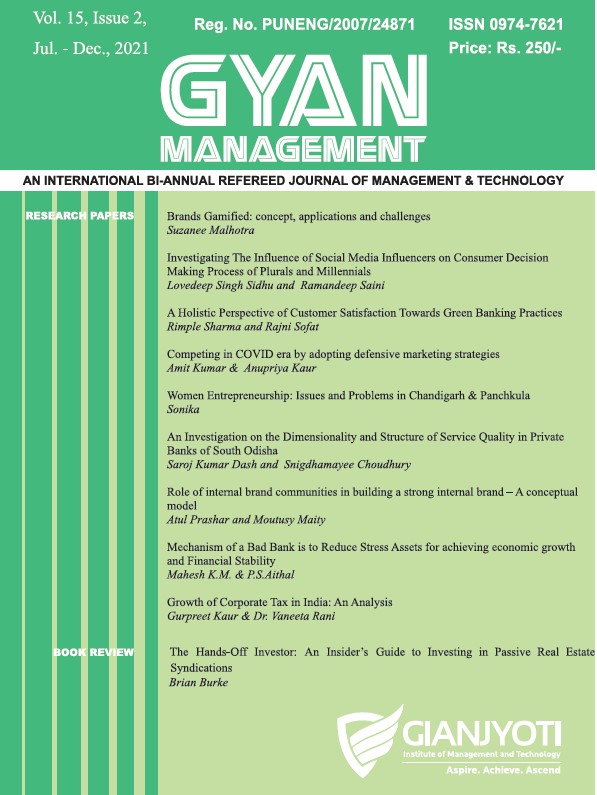Should digital taxation be in sync with the OECD-G20 Two-Pillar Framework? An Analysis of the Equalization Levy in India and Its Aftermath.
DOI:
https://doi.org/10.48165/gmj.2023.18.1.2Keywords:
Equalization Levy, Digital Taxation, Tax Treaties, Double Taxation, Two- pillar frameworkAbstract
The flourishing growth of the digital economy in India has made digital taxation an indispensable system in India’s revenue generation. The study provides a detailed assessment of the OECD (Organization for Economic Cooperation and Development)- G20(Group of 20) group’s initiatives on digital economy taxation. Furthermore, there is an in-depth analysis of the limitations of the Indian ‘Income Tax Act 1961’ and the subsequent adoption of the equalization levy. The effect of equalization levies on tax treaties, rules, and the General Agreement on Trade in Services (GATS) are examined in detail. The economic impact of the equalization levy is also evaluated by analyzing the digital trade restrictiveness index. Finally, an evaluation is carried out on the OECD- G20 Two-Pillar framework on the background of the problems of digital taxation. The study also examines the growth of the equalization levy in India and assesses the USTR (United States Trade Representative) report in light of the equalization levy.
Downloads
References
Agrawal, M. (2016). India at the Forefront in implement ing BEPS-Related Measures: Equalization Levy in line with Action 1. International transfer pricing journal.
Anuj, K., Fayaz, F., & Kapoor, N. (2018). Impact of e-com merce in the Indian economy. Journal of Business and Management, 20(5), 59-71.
Bruce, M. R., Adebayo, F. A., Boateng, S., & Appiahene, P. (2022). Comparative Analysis of Taxation Techniques and Models Used in Digital Economy. International Journal of Economics and Financial Issues, 12(6), 22.
European Centre for International Political Economy (ECIPE)- The Digital Trade Restrictiveness Index (DTRI) Report. (2018).
Faulhaber, L. V. (2019). Taxing Tech: The Future of Digital Taxation. Va. Tax Rev., 39, 145.
GENERAL AGREEMENT ON TRADE IN SERVICES 1995 – ARTICLE II, ARTICLE XVII.
Government of India, Ministry of Commerce & Industry. (2021). Rajya Sabha Unstarred Question No.1332, Equalization Revenue collection- Online Tax Accounting System.
Harpaz, A. (2021). Taxation of the Digital Economy: Adapting a Twentieth-Century Tax System to a Twenty-First-Century Economy. Yale J. Int’l L., 46, 57.
INDIA – USA Double Taxation Avoidance Agreement TAX CONVENTION WITH THE REPUBLIC OF INDIA GENERAL EFFECTIVE DATE UNDER ARTICLE 30: 1 JANUARY 1991 – ARTICLE 5, ARTICLE 7, ARTICLE 26.
Indian Brand Equity Foundation E-commerce Estimates. (2019, 2022).
Internet Advertising Revenue Reports
JP Morgan E-commerce Report India. (2020). Karnosh, K. E. (2020). The Application of International Tax Treaties to Digital Services Taxes. Chi. J. Int’l L., 21, 513.
Kofler, G., & Sinnig, J. (2019). Equalization taxes and the EU’s ‘digital services tax’. Intertax, 47(2).
Kumar & Aggarwal. (2020). International Taxation in the Digital Era. Oak Bridge., (Chapter 3).
Low, P. (2020). Digital services taxes, trade, and develop ment (No. 2020-07). Working paper.
Agrawal, M. (2016). India at the Forefront in Implementing BEPS-Related Measures: Equalization Levy in Line with Action 1. International transfer pricing journal.
Mehra & Roy. (2020). International Taxation in the Digital Era. Oak Bridge., (Chapter 2)
Nadeem, S., & Saxena, A. (2018). The challenges of Taxing E-Commerce. International Journal of Management Studies, 4(4), 56.
Nafarrate, B. (2021). Combatting Base Erosion and Profit Shifting: Is A Digital Service Tax on Revenue the Right Path toward Equitable International Taxation? Sw. J. Int’l L., 27, 368.
Noonan, C., & Plekhanova, V. (2020). Taxation of dig ital services under trade agreements. Journal of International Economic Law, 23(4), 1015-1039.
Ntiamoah, J. A., & Asare, J. (2020). Original paper taxa tion of digital business transactions: Challenges and prospects for developing economies.
Oberoi, M., & De, D. (2021). Equalisation Levy in India: An Exploratory Study.
Organization for Economic Cooperation and Development Model Tax Convention on Income and Capital. (1977)
Organization for Economic Cooperation and Development Ottawa ministerial report., (1998).
Organization for Economic Cooperation and Development Digital Economy Report., (2015).
Organization for Economic Cooperation and Development. (2018). Tax Challenges Arising from Digitalisation – Interim Report.
Organization for Economic Cooperation and Development Model Tax Convention on Income and Capital. (2019).
Organization for Economic Cooperation and Development Two-pillar framework report. (2021)
Organization for Economic Cooperation and Development DIGITAL TRADE RESTRICTEVENESS INDEX, 2022.
Sábo, J. (2020). Taxation of digital services from an inter national tax law perspective. Financial Law Review, (20 (4), 64-81.
Shome, P., & Shome, P. (2021). Taxation of Digital Economy. Taxation History, Theory, Law and Administration, 387-404.
Singh & Aggarwal. TAXATION OF DIGITAL ECONOMY IN INDIA THE WAY FORWARD Report., (2019) V I D H I Centre for Legal Policy.
Statement of India’s Digital Economy Report. (2023). Stephanie, S., & Patricia, C. (2019). Profitable giants like Amazon pay $0 in corporate taxes. Some voters are sick of it. The New York Times. April 30, 1.
Sood, R. (2023). TAXING THE DIGITAL ECONOMY: A WAY FORWARD. Bennett Journal of Legal Studies Vol.04(01), Feb 2023, pp. 120 – 130.
Telecom Regulatory Authority Annual Reports The Center for Global Enterprise. (2016). The Rise of the Platform Enterprise: A Global Survey.
Union Government of India Memorandum to Finance Bill 2016, Finance Bill 2016, Finance Act 2016 Section 165.
Union Government of India Memorandum to Finance Bill 2018, Finance Bill 2018, Finance Act 2018.
Union Government of India, Finance Act 2020 Section 165A.
Union Finance Bill 2021.
United Nations Conference for Trade and Development Report. (2022).
Downloads
Published
Issue
Section
License
Copyright (c) 2023 Gyan Management Journal

This work is licensed under a Creative Commons Attribution 4.0 International License.



